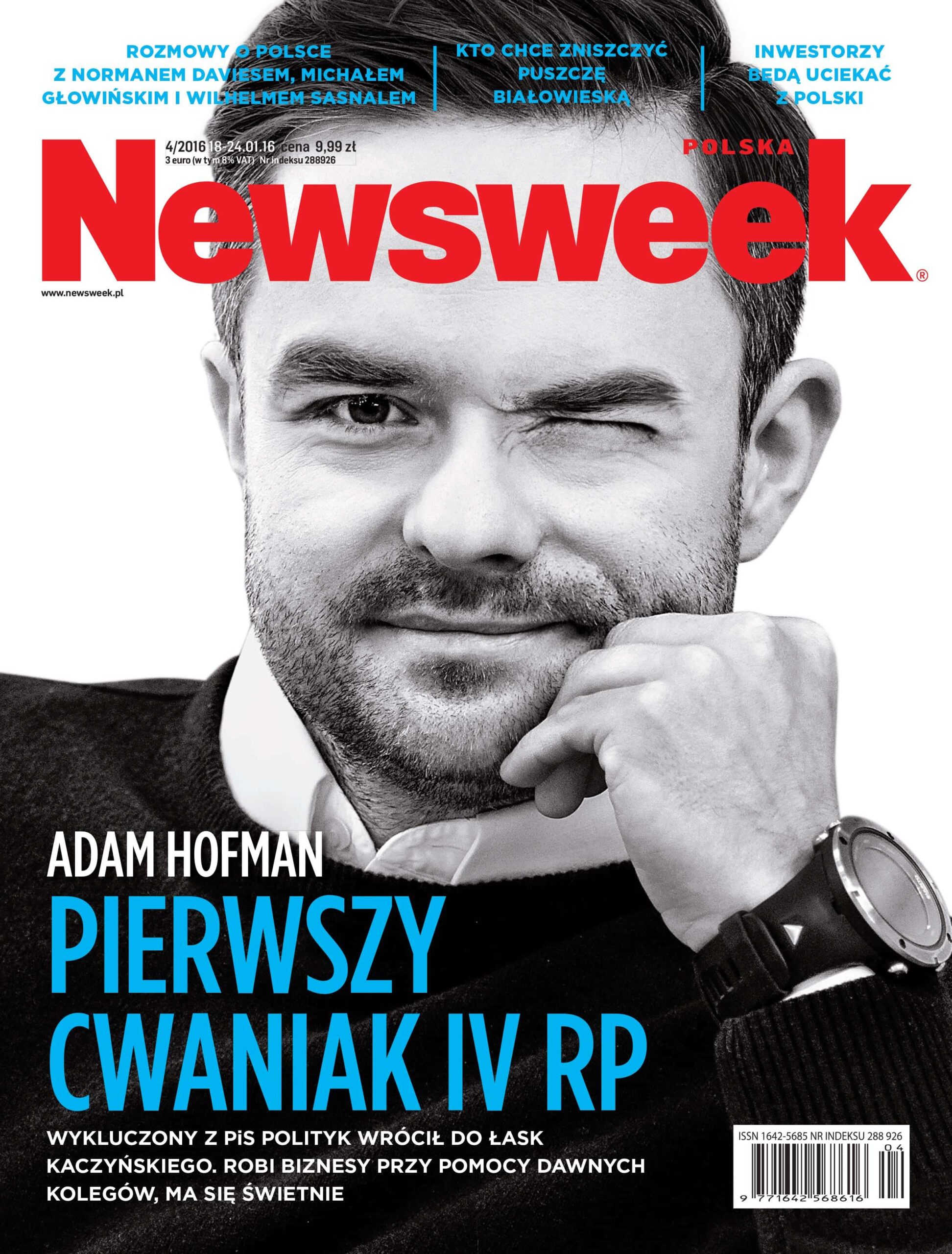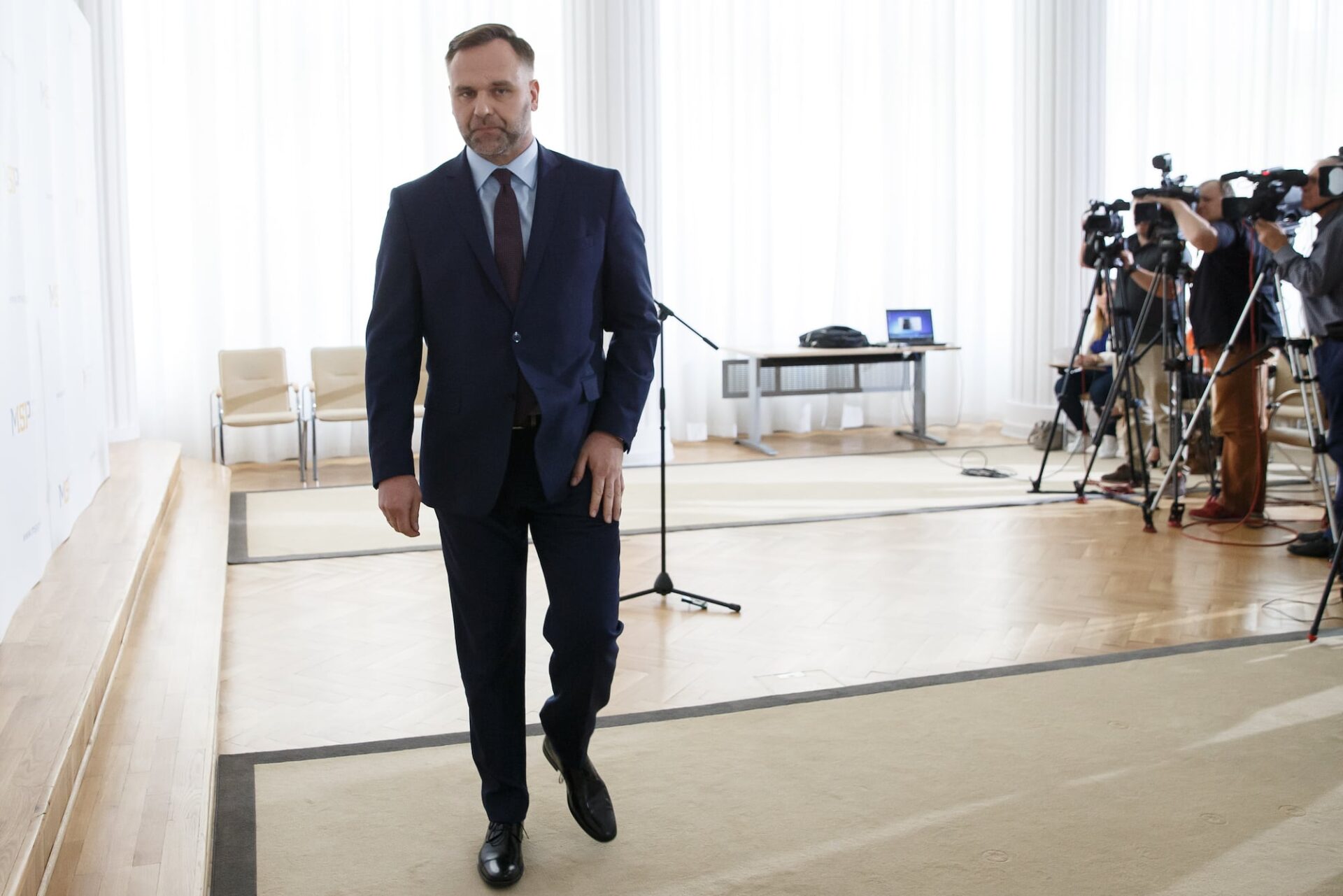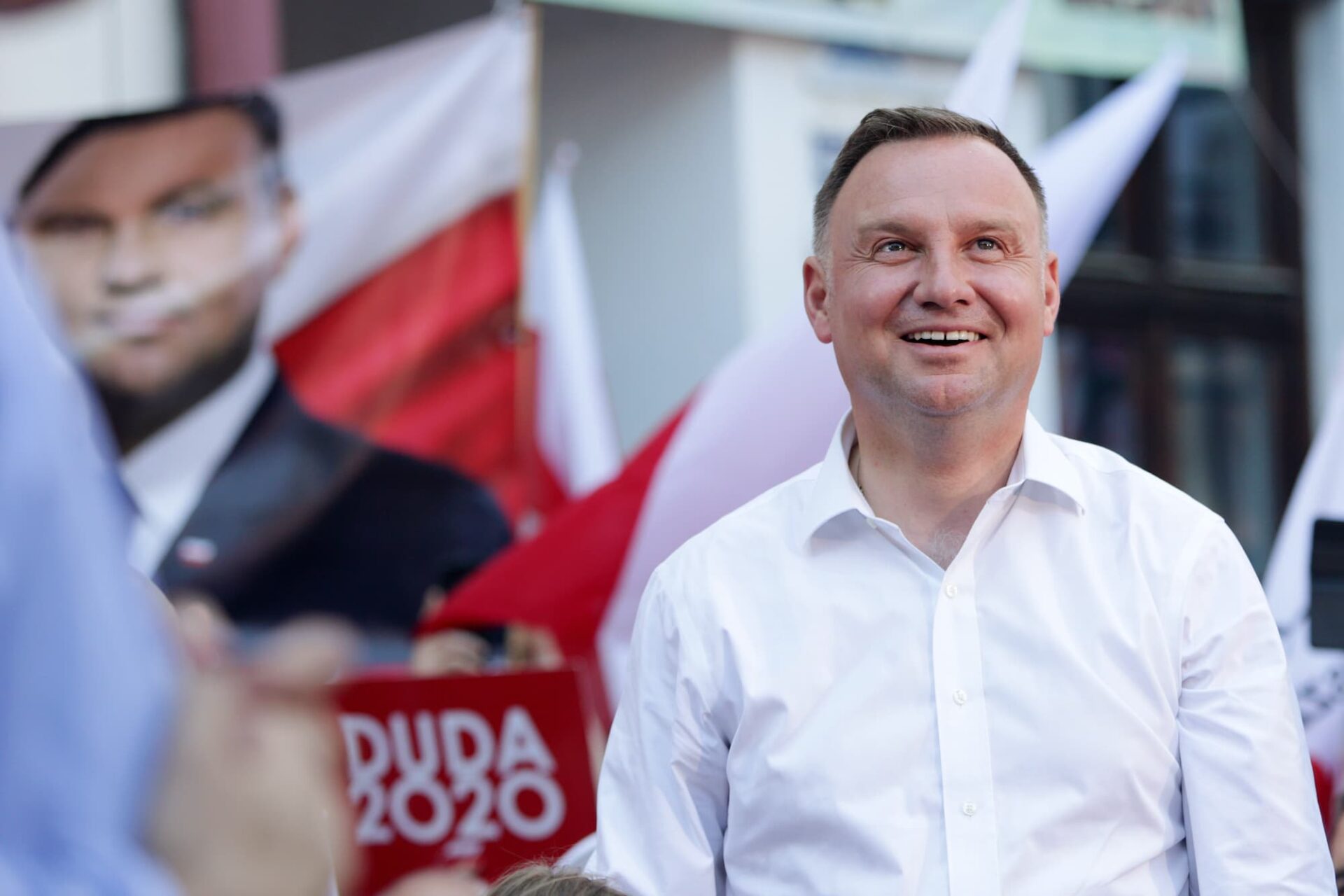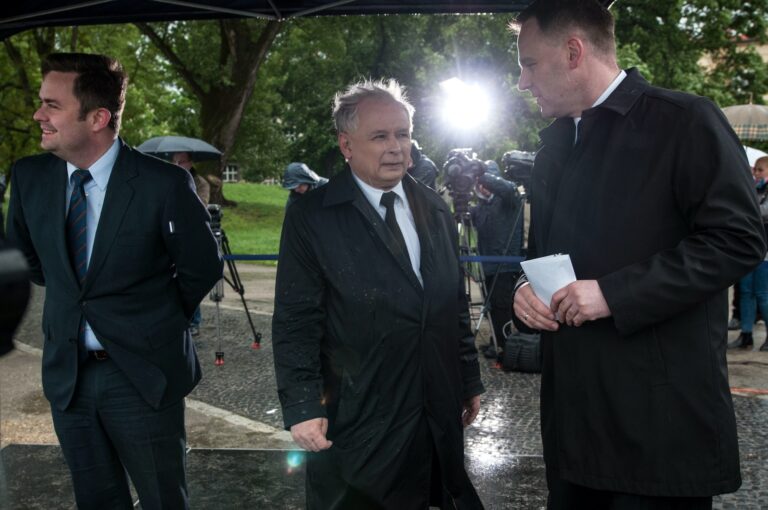Adam Hofman was once an influential politician, a member of PiS, Poland’s current ruling party, and now is one of the most recognisable figures in the country’s PR sector. He chose that career path after he had been forced to retire from politics in 2014. When PiS took power in Poland in 2015, his PR agency R4S skilfully positioned itself where the spheres of politics and business meet, working with government institutions and state-controlled entities. R4S was like a parasite on a host organism – Hofman and his company benefited from the contacts and connections in the ruling party.
by Konrad Szczygieł (Fundacja Reporterów), Sebastian Klauziński (OKO.press), Jacek Harłukowicz (“Gazeta Wyborcza”)
How is it possible that although his and his friends’ activities attracted the interest of secret services, they successfully developed their business? Not only did they continue to work for state-controlled companies, but also acted as intermediaries in contacts with the government and managed to secure public funding.
‘The Wrocław rogues’ tells a story of a group of business partners or friends and acquaintances who either come from Wrocław or were doing business there. Some of them first met during their studies at the University of Wrocław.
This is the story of a friendship between politicians and businesspeople, leaks from secret services, transactions that involve EU funds, online election manipulation and acting as an intermediary between the Polish government and Bell Pottinger, a now-disgraced PR company.
One-way flight
It was one October evening in 2014, when a group of drunken Polish tourists staggered across Madrid’s Plaza Mayor. They were loud, one of them allegedly flipped the middle finger, another simulated peeing in public, someone fell onto the pavement.
They were a group of PiS politicians, a group that included party spokesman Adam Hofman, MEP and future minister Dawid Jackiewicz, MPs Adam Rogacki and Mariusz Antoni K. They were young, smart-mouthed and overconfident. They were rising stars of evening TV. A trip to Madrid marked the beginning of the end of their political career.
The Polish tabloid Fakt later ran a story, which described how, on a flight to Spain, the wives of politicians got into a heated argument with a flight attendant who had pointed out that they were not allowed to bring and drink their alcohol on the flight. Other media outlets quickly circulated the story. It turned out that Hofman, Mr K. and Rogacki had taken out a total of several thousand zlotys (several thousand euros) from the Polish parliament (Sejm) cash desk for travel expenses but instead of travelling by car, they chose low-cost airlines.
For PiS, which dreamt of taking power in 2015, a scandal involving its MPs could harm the party’s image. Hofman, Rogacki and K. were forced to return the money and disappear from politics for a while. Jackiewicz avoided any sanctions as he was the only one who had paid for the trip out of his own pocket.
The group of politicians who flew to Madrid were not present in the media and politics for nearly a year. During that time, the prosecutor’s office was investigating ‘unfavourable disposal of [the Sejm’s] property’. Eventually, the proceedings were dropped.
Like a phoenix from the ashes
Former influential PiS politicians quickly re-defined themselves in the new political landscape. When PiS won the elections in the autumn of 2015, Hofman, Mariusz Antoni K., Rogacki and Jackiewicz re-emerged as party members. On election night on October 25, a Newsweek Polska reporter described Hofman’s meeting with the PiS election campaign staffers, reporting his conversation with PiS chairman Jarosław Kaczyński.
‘Oh, the prodigal son has returned,’ Kaczyński remarked.
‘The prodigal son is here [Hofman pointed to Jacek Kurski, future president of Poland’s national TV]. I have remained faithful to my father. And I haven’t been presented with a fattened calf,’ Hofman quipped.
The former PiS spokesman did not have to wait long for his share of the ‘fattened calf’. His friend Dawid Jackiewicz became the Minister of the Treasury, and Hofman and his friends set up R4S, a PR company. Newsweek Polska reported that Hofman was a regular visitor at the Ministry of the Treasury.
Late 2015 and early 2016 was a key moment for the ‘Wrocław rogues’. The spoils of a political war (management jobs in large companies) are shared between trusted people by both Jackiewicz and Hofman. Their mutual friends join the management and supervisory boards of state-controlled entities, including the Azoty Group, KGHM, LOT, Totalizator Sportowy, Tauron and Energa.
R4S was also doing great. We have gained access to CBA estimates that revealed that in just over a year since the opening of the bank account, it had earned over 1 million euros, including almost 250,000 euros from state-controlled companies or their subsidiaries. For a newcomer to the PR sector, those earnings were massive.
In late 2015 and early 2016, Robert Pietryszyn, another member of the ‘Wrocław rogues’, former PiS activist and president of the stadium in Wrocław, arrived in Warsaw. He is Hofman’s closest friend, who had been a witness at his wedding years ago.
In January 2016, Pietryszyn was appointed to the management board of Powszechny Zakład Ubezpieczeń (PZU), and from there he moved on to the fuel company Lotos, becoming the group’s president. Both companies, on the other hand, are controlled by Jackiewicz, who serves as Minister of the Treasury.

Adam Hofman on the cover of Newsweek Polska, 2016
Initially, PiS party leaders on Nowogrodzka Street did not react when Hofman – who not so long ago had been the party’s black sheep – together with his friend Jackiewicz began to build their influence in state-controlled companies.
Yet some time passed and the activities of Jackiewicz and Hofman gained attention. In mid-January 2016, Newsweek Polska ran a piece about R4S, with Hofman’s cheeky smile on the cover followed by ‘Adam Hofman, a success story in the business sector’ headline.
‘Looking out the window of his office on the 26th floor, the PiS headquarters seems small and ugly, but the former party member doesn’t worry about it anymore. Today, he is working in the business sector and is no longer attracted to politics. When someone expresses surprise, Hofman asks whether he was supposed to get a ditch digging job,’ we read in another media report about the former PiS spokesman.
At the same time, the Central Anticorruption Bureau (CBA) decided to investigate what the scheme created by him and Jackiewicz involved. The plan was implemented in April 2016 and codenamed ‘Argon’.
Agents wiretapped and collected information about the activities of a group they suspected of using political connections in business.
Poland’s Bell Pottinger
In the summer of 2016, CBA notes that Hofman met the presidents of state-controlled companies, and acted with redoubled energy.
‘Hofman came up with the idea of creating the Polish National Foundation (PFN),’ says a businessman associated with the ‘Wrocław rouges’.
PFN is to ‘promote the image of Poland’ abroad. The idea was simple – state-controlled companies would make a million-dollar contribution, and Hofman’s agency, R4S, would cooperate with the foundation that received the funding.
Officially, the idea to create PFN came from Minister Jackiewicz. It was him who, alongside the then Prime Minister Beata Szydło, announced its creation in July 2016. The Foundation’s budget – initially 21 million euros, (today 44 million a year) is to be donated by 17 state-controlled companies.
It is now time to come back to the events that unfolded in London on 14 June 2016. Adam Hofman and Michał Wiórkiewicz – also a former PiS politician and later a partner at R4S – met with representatives of Bell Pottinger, a British PR company. International media have dubbed it ‘an agency for despots and rogues’. Although it was one of the largest public relations companies in Europe, in 2017, Bell Pottinger filed for bankruptcy as a result of a media scandal.
In London Hofman and Wiórkiewicz met one of the most important people at Bell Pottinger – managing partner David Beck.
‘Beck’s presence at the meetings shows that the contract was important to the agency, that they took it very seriously,’ our source explains.
There were several meetings between R4S with Bell Pottinger in London and Warsaw. We have gained access to their details.
According to our sources, Hofman and Wiórkiewicz negotiated a contract with Bell Pottinger, quoting influential contacts in the Polish government. The agency was to promote Poland abroad in 2016. One of the meetings between Bell Pottinger and R4S was held in the office of the Minister of the Treasury Dawid Jackiewicz, whom we had introduced earlier.
When R4S was holding talks with Bell Pottinger on promoting Poland abroad, the British PR company had already been involved in, among other things, polishing the image of the Belarusian leader Alexander Lukashenka, working for the Chilean dictator Augusto Pinochet and the family of the President of Syria Bashar al-Assad.
However, the contract was not signed. Three months later, Jackiewicz was dismissed, and the ‘Wrocław rogues’ were temporarily cut off from direct influence in the government. Who threw sand in the gears of such a well-oiled political mechanism?
The leak
In September 2016, Poland holds the Economic Forum in Krynica. It is the country’s largest annual event which brings together people from the world of business and politics, Poland’s domestic equivalent of the Davos summit. The head of the ruling party Jarosław Kaczyński is also present at the Forum. He avoids meeting anyone who might be a member of the ‘Wrocław rogues’ – they are no longer welcome.
A few days after the Economic Forum in Warsaw, a meeting of the PiS political council is organised. The party chairman warns his MPs that ‘there are people who say they have my ear, who say that I was behind some of the nominations’. Kaczyński also stresses that the ‘Good Change’ – which was the slogan for the elections won by PiS – promised to fight government favouritism, not to create new connections.
Jackiewicz already realised that it was his political demise. Before he met Kaczyński, he had held another meeting. Paparazzi working for the tabloid Fakt had spotted him at a pub in Warsaw’s Piękna Street. Hofman and Pietryszyn were also present there. A visit to the PiS headquarters at Nowogrodzka Street was short – Jackiewicz had not even said anything and left the government. According to our sources in the ruling party, Kaczyński’s desk already contained a CBA report from Operation Argon.

Dawid Jackiewicz after announcing his resignation from the government, Warsaw, 15.09.2016. Source: Krystian Maj/FORUM
How did Operation Argon end? We have learned that after a few months, in the autumn of 2016, it was suddenly discontinued. Several of our sources indicated that it was due to a leak.
‘While investigating the case, it turned out that one of our operatives had contacted the people under surveillance. Soon afterwards, they stopped talking to each other on the phone,’ our source at the Bureau says.
One of the operatives we have reached out to claims that during the period of CBA surveillance, Jackiewicz displayed unusual behaviour for a minister – he bought several prepaid SIM cards, which made it difficult to trace who was using them. At that time, it was not necessary to register them in Poland using your name.
After the leak, some members of the ‘Wrocław rogues’ no longer contacted each other. At the Warsaw CBA headquarters, a confidential investigation was launched aimed to uncover what had happened at the Wrocław office.
Someone connected the dots – noticed that the strange behaviour of the people under surveillance coincided with the promotion of Piotr S. in the Bureau’s structures. He was Pietryszyn’s colleague from the Faculty of Law, Administration and Economics at the University of Wrocław. Pietryszyn was a partner at R4S and one of the people under CBA surveillance.
Shortly after PiS took power in Poland, Piotr S., a long-time CBA agent, was appointed head of a department at the Bureau’s field office in Wrocław. In this capacity, using an official procedure, he allegedly learned about Operation Argon.
After a leak was detected, the atmosphere around Piotr S. thickened. ‘He compromised the work of others,’ a high-ranking CBA officer told us.
S. was first placed at the disposal of the Bureau management. He reported work every day but did nothing. In mid-2017, he left CBA. But the Bureau had to admit defeat – there was no clear evidence that he had been behind the leak.
Przemysław K., head of the field office in Wrocław, also lost his job. ‘The director had problems because of Piotr,’ one of our sources says.
Piotr S. refused to talk to us. Unlike Dawid Jackiewicz, who answered our questions. The latter claimed to know nothing about the leak or Operation Argon.
CBA failed to collect enough evidence for the prosecutor’s office to formally charge the ‘Wrocław rogues’. Yet, we have established that the operation collected enough information to make the PiS leadership dismiss Jackiewicz.
In the conversations of the ‘Wrocław rogues’, which were tapped by CBA agents before the operation was suddenly discontinued, another important figure emerged in the business and political puzzle – that of Radosław Tadajewski.
Cambridge Analytica built using EU money
Tadajewski is a businessman and an expert in new technologies – at least that is the image he paints in rare interviews.
Hipster eyeglasses, socks adorned with a snowman pattern, a swearword to shorten the distance, sometimes exaggerated gestures. Tadajewski leaves his interlocutors with an unwavering feeling that this is what a modern man of success looks like and behaves like. In recent years, he has taken great care to ensure that he is not publicly associated with the ‘Wrocław rogues’.
Some companies related to Tadajewski offer advanced online marketing tools. The businessman developed them under PiS rule using large public subsidies.
When the victory of Andrzej Duda, PiS candidate in the presidential election in 2020, hangs in the balance, the party headquarters sounds an alarm. It is Radosław Tadajewski who comes to the rescue. He suggested a company that later helped Duda win a second term.
For years, Tadajewski has been a close friend of Hofman – their families have gone on holiday together and they attended each other’s birthday parties. Tadajewski worked on PiS campaigns in 2014 – it was then that Hofman introduced him to PiS leadership. In 2020, Tadajewski acted as an intermediary and brought hyperCREW, a Wrocław-based marketing agency, to PiS.

Andrzej Duda during the election campaign, Skoczow, Poland, 26.06.2020. Source: praszkiewicz / Shutterstock
“We launched a campaign called ‘One per cent for Andrzej’. The idea was to get so many votes for [Andrzej] Duda on the Internet”, says our source from the PiS campaign staff. “And we did it”. Andrzej Duda won the elections by a margin of 2 percentage points.
During the three weeks of the campaign, hyperCREW earned 330,000 euros. This was one of the higher costs incurred by Duda’s election committee. At the National Electoral Commission (PKW), where parties file election documents related to campaign expenses, we have found three invoices issued by the company – for ‘creating and managing a targeted marketing campaign in digital channels’.
HyperCREW is part of Tadajewski’s latest idea to earn money.
In 2018, his investment fund Czysta3.vc received 8.8 million euros from the National Centre for Research and Development (NCBiR) – a state institution that grants subsidies to innovative businesses. The subsidies come from EU funds. According to documents submitted to NCBiR, Czysta3.vc pledged to invest in innovative companies. Dawid Jackiewicz, one of the ‘Wrocław rogues’ we had introduced earlier, advised on the investments.
One of the ‘innovative’ companies supported by Czysta3.vc was a company with the familiar name of hyperBIZ. Shortly before the elections in 2020, it had received 175,000 euros. It pledged to spend it on ‘Developing a technology that will enable in-depth analysis and drawing conclusions from activity on social media users’ accounts’.
In short – it used EU funding to work on profiling Twitter users, which used psycho targeting.
HyperBIZ is managed by Paweł Bobyk and Andrzej Rabsztyn, who are also the owners of hyperCREW, which was involved in Andrzej Duda’s presidential campaign last year.
Algorithm X
Let’s go back a few years. In March 2018, the naTemat website ran an interview with Radosław Tadajewski. It marked the first and only time the businessman appeared in the media to discuss an election campaign. He revealed that the company associated with him had worked for a large political party.
‘We bought in the right forms of advertising and based on our expertise at that time, we offered particular groups of voters different information,’ he declared.
‘Are you talking about PiS?’ the journalist asked.
‘Yes, the media wrote about it, because the cooperation was fully public and the company’s invoices were filed with PKW together with the reports of the election campaigns. It is easy to establish when this cooperation lasted, not only using past invoices but also a positive breakthrough in PiS ratings in those years,’ said the businessman.
How did Tadajewski’s company provide PiS with a breakthrough in the ratings? In an interview with us, he explains that they used a tool for ‘heating up’ discussion topics.
His employee created twenty Facebook accounts on the social networking site, where the arguments used in discussions were ‘heated up’ using paid campaigns. People learned, for instance, that petrol was too expensive, or that nurses’ salaries were low. After 24 hours, fifteen of these accounts were removed, because they were not visited by Internet users. Five were left to promote the topics using the remaining part of the budget. After the next 24 hours, two accounts remained, with 10,000 real online users who were lured to share ‘likes’ with 1,000 purchased ‘likes’.
‘This is what true online propaganda is about – not unimaginative quantitative hitting but seeing what works and finding those narrative lines that affect people. People are starting to interact with them,’ one of our sources says.
Tadajewski’s interview with naTemat is largely an advertisement for his business. It surfaced at a time when the media around the world were writing about the Cambridge Analytica (CA) scandal. By obtaining data on internet users, CA manipulated online behaviour, working on Donald Trump’s campaigns and Brexit.
‘A Polish company does what Cambridge Analytica does,’ naTemat writes. It refers to Tadajewski’s new business called 1450.
The name celebrates Jan Gutenberg’s revolutionary invention of a printing press in 1450.
Early in 2018, 1450 pocketed some public money – over 660,000 euros in an EU grant to ‘develop an innovative internet platform for building and analysing the online image’. What was Tadajewski going to do with this money?
1450 was working on algorithms – let’s call them X and Y – designed to track web users and categorise their comments according to what emotions they express. But for the algorithm to work, it must first know what key it should use to collect data about internet users.
‘One theory was that if you had an algorithm, you could use it in politics. If you’re planning a [election campaign] meeting in a small town, for instance, Żnin or Augustów, you can discover exactly what the town’s residents are talking about. And better manipulate voters than anyone else,’ says a source familiar with Tadajewski’s algorithm. ‘The algorithm was supposed to collect data from the entire Internet, give in-depth information about users. What Cambridge Analytica said about employing user micro-targeting – that was Radek’s ambition. He wanted to have a thousand ways to reach very small, carefully selected groups’.
We came across an ad that 1450 published in November 2018, which targeted scientists and research centres.
‘The company will develop a structure of authors’ profiles (…), which would contain at least ten personality types. Each of these ten profiles will be described by demographic and psychographic data. (…) The algorithm (…) will define the internet user profile based on the collected data’.
Tadajewski travelled the world looking for buyers for his algorithms. He was also looking for a way to get the army interested and was assisted by the former spokesman for the ministry of defence Bartłomiej Misiewicz. CBA recorded conversations between Misiewicz and Tadajewski. The former, an influential official at the ministry of defence who left the party and the office in an aura of scandal, is now suspected of corruption, arranged some meetings between Tadajewski and high-ranking officials at the ministry and even introduced him to the chancellor of a military university.
NATO? Tadajewski’s calling!
In an interview with naTemat, Tadajewski said that he was interested in the fight against disinformation and fake news. ‘Identifying disinformation activities’ was also included in the application form for EU funding for the algorithm developed by 1450.
Tadajewski talked a lot about disinformation with Bartłomiej Misiewicz, whom he considered an expert in this field. He takes his presentation to the most important military university in Poland – the War Studies Academy. At Misiewicz’s suggestion, he turned to StratCom, an analytical institution founded by NATO member states. It is one of the most important agencies that research Russian disinformation in Europe. Tadajewski showed up at its headquarters in Riga and presented an offer of cooperation.
We asked StratCom whether what tools Tadajewski offered.
‘Mr Tadajewski and his company offered an online media monitoring product, which was tested by NATO StratCom, but after the test, we did not purchase the product,’ says StratCom spokeswoman Linda Curika.
‘Why didn’t you decide to buy?’ we press on.
‘There is a range of similar tools on the market, the solution they proposed was just one of many,’ she explains.
When we send Tadajewski some questions about his cooperation with StratCom and tools developed by 1450 for Internet users, we do not hear from Tadajewski but the businessman’s lawyer Maciej Zaborowski.
‘The company 1450 SA provides a system for detecting unnatural activities in the digital realm. The offered platform is the most advanced tool available to civilian entities, and allows for early detection of unusual attempts to spread online news,’ Zaborowski writes.
In modern marketing, the tools developed by 1450 can give you an advantage on the Internet – they allow you to see who is talking about a given company or product, what product they are talking about and when that takes place. The company or product can be replaced by a political party.
In 2018, 1450 SA earned around 75,000 euros. In 2019, its earnings rose to over 100,000 euros.
Throughout this period, Tadajewski maintained friendly relations with the ‘Wrocław rogues’. His family went skiing with Hofman’s family, Tadajewski enjoyed himself at his birthday party.
In an exclusive interview for the Reporters’ Foundation Hofman told us that R4S had used some solutions developed by Tadajewski, but no longer does because they proved too expensive.
Wyświetl ten post na Instagramie.
Tadajewski has denied any contacts or ever cooperating with R4S. His Instagram profile shows that he shares his time between Brazil, Poland and Borneo. He also stays at an apartment in a luxurious high-rise building in downtown Warsaw. Looking out the window, he can see the office building where Hofman and Pietryszyn reside. All three form the backbone of the ‘Wrocław rogues’.
Tadajewski has not stopped his attempts to cooperate with the army and support the PiS campaign. PR companies linked to Tadajewski are working not only for PiS but also for state-controlled companies, including the fuel giant Orlen.
On the other hand, R4S has since fallen into an image crisis. When we revealed in the autumn of 2020 that the group was using a troll farm to implement a contract signed with Coca-Cola, the soft drinks group terminated its cooperation with the agency. Soon after, IKEA also decided it no longer wants to be supported by R4S. And Adam Hofman does not have the best ratings in PiS today.
‘On Nowogrodzka [Poland’s ruling party headquarters], saying you know Hofman is worse than admitting to paedophilia,’ says one of our sources.
by Konrad Szczygieł (Fundacja Reporterów), Sebastian Klauziński (OKO.press), Jacek Harłukowicz (“Gazeta Wyborcza”)
Cover photo: Adam Hofman (L), PiS chairman Jarosław Kaczyński (C) and Dawid Jackiewicz (R), 6.05.2014, Wrocław. Source: Bartlomiej Kudowicz / Forum







